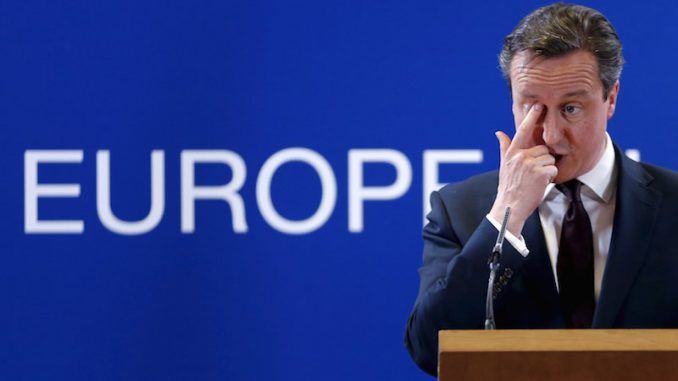
British Prime Minister David Cameron has vowed to rid Britain of “extremism” (which includes conspiracy theories and alternative research) by restricting freedom of speech.
In a stern speech, the PM said that internet companies who fail to “protect” visitors from Islamist propaganda, as well as websites that promote wild conspiracy theories such as “9/11 being an inside job“, would be targeted under proposed new thought police powers.
Telegraph.co.uk reports:

BYPASS THE CENSORS
Sign up to get unfiltered news delivered straight to your inbox.
You can unsubscribe any time. By subscribing you agree to our Terms of Use
We must remind these people, and everyone, that Britain remains a “beacon to the world”, said Cameron. We have good values and we should big them up, he said, in the “struggle of our generation” — the struggle against violent Islamist extremism.
Yet elsewhere in the speech, a mere few breaths after talking about Britain’s beacon status, Cameron showed just how cavalier he is about freedom of speech — surely the most important values in any society that considers itself enlightened.
He said he would give Ofcom more powers to tackle foreign TV channels that promote hateful messages. He had a go at the media for giving a platform to extremist Muslim voices, which sounded to me like pressure from the very top of the political sphere to get the media to “no platform” undesirable people.
But worst of all, he set out his government’s commitment to tackling what he called “non-violent extremism” — that is, people who don’t promote or partake in violence but who simply have ugly beliefs.
He said his government will “tackle” all those who “may not advocate violence but [who] do promote other parts of the extremist narrative”.
This is a step too far. This moves officialdom from the realm of physical acts and violent plots, which it absolutely must police, into the realm of speech and debate, where official clampdowns can never be justified.
We don’t have to wait to see what Cameron means by “tackling” non-violent extremism. His ministers have been spelling it out for months.
At the end of last year Theresa May openly said she was sick of having to distinguish between extremists who plot violence and extremists who simply spout nonsense.
“The problem that we have had is this distinction of saying we will only go after you if you are an extremist that directly supports violence”, she said.
The government will “eliminate extremism in all its forms”, she said, defining as an “extremist” anyone who lacks “respect for the rule of law” or “respect for minorities”. This could cover, not just Islamist hotheads, but Trotskyists who don’t respect British laws or Christians who don’t support gay marriage (and therefore don’t have “respect for minorities”).
In the Queen’s Speech in May, the government introduced Extremism Disruption Orders, which can be used to shut-up anyone who says extremist things. If you’re served with an EDO you can’t speak on a public platform. And you need permission from the police even to tweet. It’s terrifying.
What May and Cameron view as the pesky distinction between action and speech, between violent and non-violent extremism, is actually the foundation stone of all free, enlightened societies: we police criminal behaviour, but not thoughts, ideas, words.
“Extremism Disruption” is a fittingly Orwellian phrase, because the Conservatives have just introduced thoughtpolicing, the punishment of people not for what they do but for what they *say*.
Freedom of speech is more than just a value. It is the best tool we have for tackling the backward ideas of Isil and its creepy fanboys. We need more openness and debate, not less, in order to expose conspiracy theories and challenge the hateful.
Yes, freedom of speech allows irritants to say stupid things — but it empowers the rest of us to have it out with them. In silencing non-violent extremists, Cameron is also infantilising us non-extremists, denying us the opportunity to do our public duty and have a war of words with these reactionaries.
So, Cameron holds Britain up as a beacon to the world while extinguishing what ought to be the flame in that beacon: freedom of speech. If this really is the struggle of our generation, it just got off to a really bad start.


Britain is proud of freedom of thought and freedom of speech. Maybe Mr C is afraid of criticism!
Britain is proud of freedom of thought and freedom of speech. Maybe Mr C is afraid of criticism!
this is the sort of english thinking which brought about all that unpleasantness in 1776….
this is the sort of english thinking which brought about all that unpleasantness in 1776….
Hey Cameron go FUCK YOURSELF BITCH! And give the Falkland islands back to ARGENTINA!
Hey Cameron go FUCK YOURSELF BITCH! And give the Falkland islands back to ARGENTINA!
Are the natives getting tired of your BS??